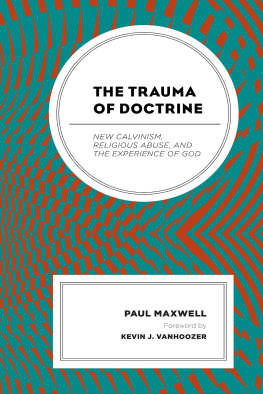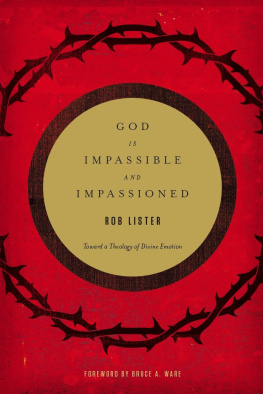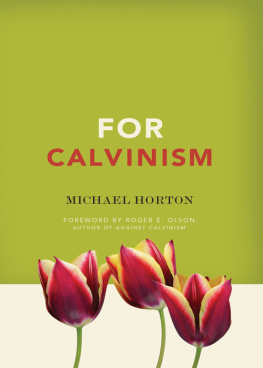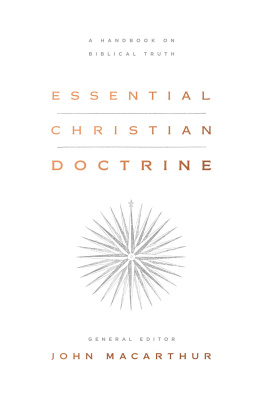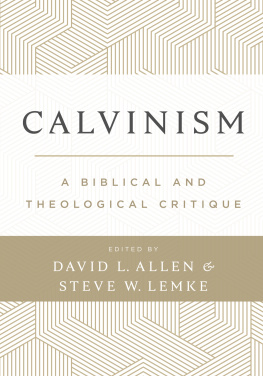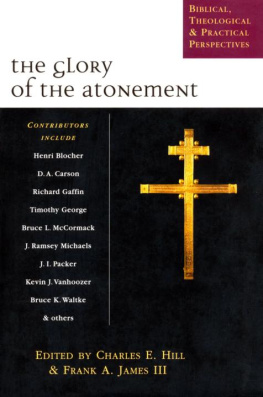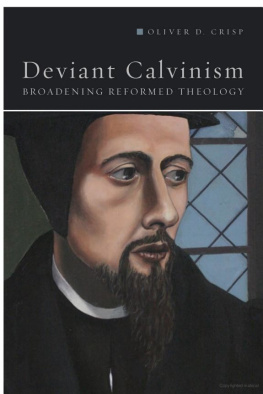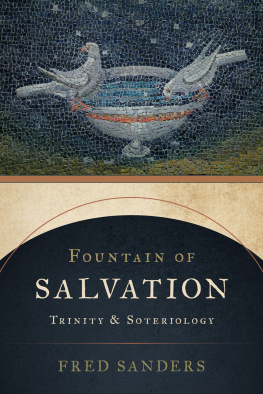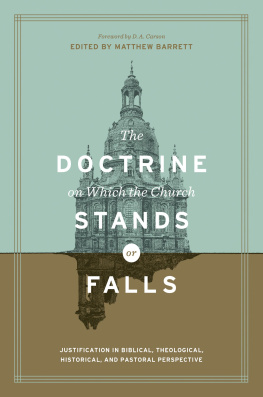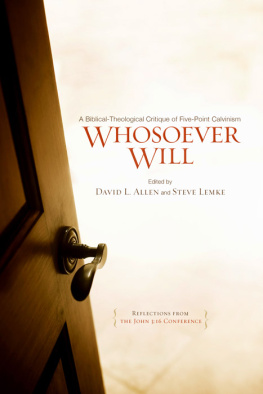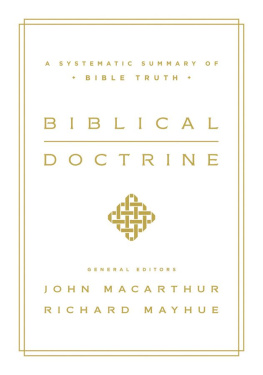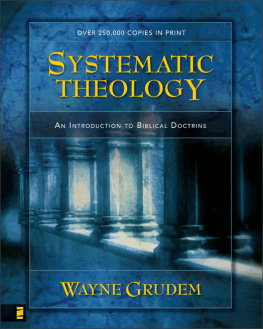Saved by Grace through Faith or Saved by Decree?
A Biblical and Theological Critique of Calvinist Soteriology
Geoffrey D. Robinson
Saved By Grace Through Faith or Saved By Decree?
A Biblical and Theological Critique of Calvinist Soteriology
Copyright 2022 Geoffrey D. Robinson. All rights reserved. Except for brief quotations in critical publications or reviews, no part of this book may be reproduced in any manner without prior written permission from the publisher. Write: Permissions, Wipf and Stock Publishers, W. th Ave., Suite , Eugene, OR 97401 .
Wipf & Stock
An Imprint of Wipf and Stock Publishers
W. th Ave., Suite
Eugene, OR 97401
www.wipfandstock.com
paperback isbn: 978-1-6667-3389-1
hardcover isbn: 978-1-6667-2888-0
ebook isbn: 978-1-6667-2889-7
03/28/22
Unless otherwise indicated, all Scripture quotations are taken from the (NASB) New American Standard Bible, Copyright 1960 , 1971 , 1977 , 1995 by The Lockman Foundation. Used by permission. All rights reserved. www.lockman.org
Yet no matter how convincing such disproofs might appear, no matter how contradictory and unreal much of the Darwinian framework might seem to anyone not committed to its defense, as philosophers of science like Thomas Kuhn and Paul Feyerabend have pointed out, it is impossible to falsify theories by reference to the facts or indeed by any rational or empirical argument. The history of science amply testifies to what Kuhn has termed the priority of the paradigm and provides many fascinating examples of the extraordinary lengths to which members of the scientific community will go to defend a theory just as long as it holds sufficient intrinsic appeal.
Michael Denton, Evolution: A Theory in Crisis
Although the geocentric theory was not the only theory proposed to account for the movements of the heavenly bodies... by the late middle ages it had become a self-evident truth, the one and only sacred and unalterable picture of cosmological reality.
Michael Denton, Evolution: A Theory in Crisis
His prescription to avoid faiths pitfalls was that people should exercise critical judgment in relation to their beliefs so that the faith held is reasonable.
Barry L. Callen, concerning Clark H. Pinnock
Introduction
C alvinism, the understanding of Scripture that stresses Gods sovereignty over all things, including an individuals salvation, is not as popular as it once was in decades past. Nevertheless, even when the term is not used, often the concepts associated with Calvinism (known also as the doctrines of grace) continue to play a significant role in the life of both individual believers and in the church. This is especially so amongst churches that trace a Reformed heritage, though by no means limited to such traditions.
My own spiritual pilgrimage began in a context where a weak but clearly present form of Calvinism existed. However, as I progressed in my understanding of the faith and in my own reading of the Bible, I gradually became increasingly aware of a certain discomfort between the Calvinism I heard preached and taught and my own understanding of Scripture. Was it really the case that God unilaterally decided who would be saved and who would not? Was Gods grace really not resistible and, if so, how did my sinning fit in? Was it true that human nature was so depraved that a person was totally incapable of even responding to the gospel invitation apart from Gods effectually causing him to respond? Was faith really a gift of God; if so then who was to be blamed when individuals refused to believe? And so on. These were the sorts of questions I struggled to come to terms with.
It would be many years before I could precisely identify and articulate the source of my discomfort, but even at an early stage of my Christian life I realized that what I heard being taught and believed by godly Christians did not seem to correlate with my own reading of the Bible (especially the New Testament). The result was confusion. How could these preachers, teachers, authors, and friends possibly be mistaken? Even the possibility seemed inconceivable to me. Werent they merely expressing what Calvin, Luther, and the other great Reformers of the Protestant Reformation had taught?
The focus of my confusion lay in the doctrine of salvation, formally known as soteriology. However, since this doctrine is intimately connected with other doctrinesin this case the doctrines of Humanity, Grace, God, Christ, the Spirit, and Providence, to name a fewit was not easy to understand the issues and how they related to one another and so bring the needed clarity. Eventually, however, after much reading and after eight years of theological education, clarity did come, confusion was greatly reduced and a peace concerning the truth about the meaning of salvation enjoyed.
This present study arises from the conviction that many sincere Christians are today as confused about this doctrine as I was. This confusion is held by both lay persons and by pastors. My goal is to help us all see more clearly and more accurately what the Bible really teaches about this important doctrine. My hope is that uncertainty and confusion will be replaced by understanding, clarity, and a confidence in working out our salvation borne of insights that faithfully reflect Gods word.
A word about terminology; I use the term Calvinism somewhat reluctantly and only because it concisely encapsulates the distinct set of beliefs associated with the name of the great sixteenth-century Reformer John Calvin. There really is no other term or phrase that can accurately and succinctly take its place. Furthermore, this is the term traditionally and historically used in this sort of context.
My approach follows from the desire to bring clarity to the doctrine of salvation in order to remove confusion caused by those who espouse a view that is, I believe, fundamentally flawed. Consequently, I will use the Calvinists view of salvation as a foil with which I can interact with the doctrine. This indirect approach will serve on the one hand to show where and why Calvinism fails and, on the other hand, to provide a more biblically faithful and coherent understanding of the doctrine, though the emphasis will necessarily fall upon the former given the focus of this study as stated in the title of the work.
There are several reasons for Calvinisms popularity and appeal both in the past and also today. First, Calvinism is a well-defined and internally consistent doctrinal system. All the elements that make up a Calvinistic soteriology hang together very tightly with no internal contradictions. As we shall see, part of the reason for such internal coherence is the prominent role the Calvinistic understanding of predestination holds within the system. Of course, internal consistency need not necessarily mean the doctrine is true. Consistency is a necessary but not sufficient criterion of veracity. Nevertheless, the coherence of Calvinistic soteriology has a certain appeal that serves to reinforce the belief that the Calvinistic perspective must be true.
Another reason that helps explain Calvinisms appeal is its concern to uphold the glory of God. This is apparent in John Calvins own writings and in the writings of many Calvinists to this day. It is probably true to say that concern for Gods honor and glory is a high motivation for the embracing of the Calvinists doctrines of grace. (Of course, this may also explain why some Calvinists not only hold fast to their Calvinist convictions, but also why they sometimes appear rather dogmatic in their defense of Calvinism).


